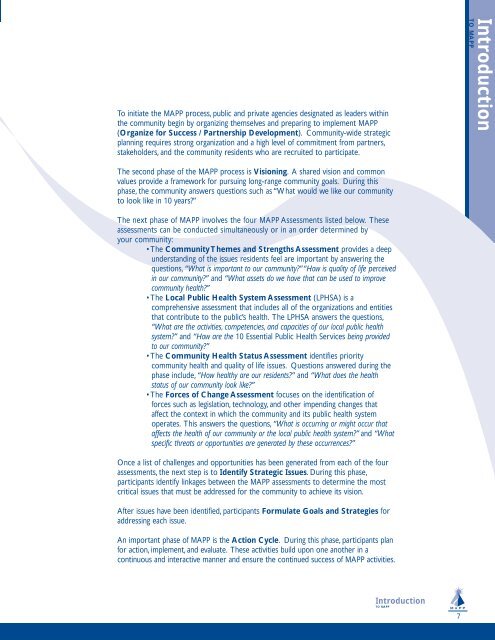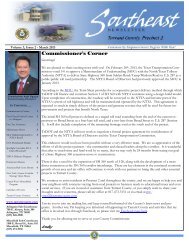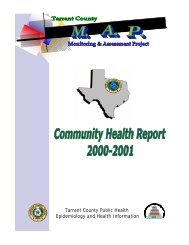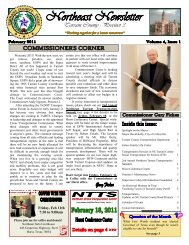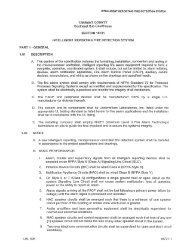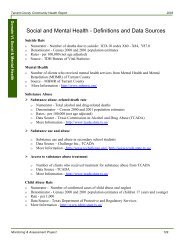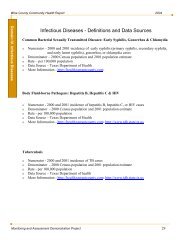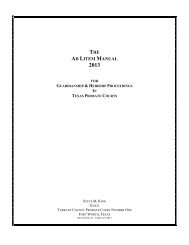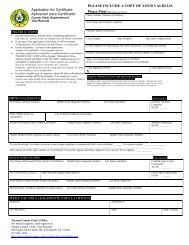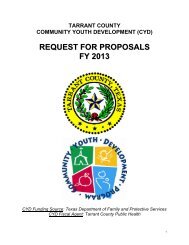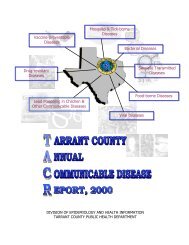MAPP Handbook - The National Association of County and City ...
MAPP Handbook - The National Association of County and City ...
MAPP Handbook - The National Association of County and City ...
Create successful ePaper yourself
Turn your PDF publications into a flip-book with our unique Google optimized e-Paper software.
To initiate the <strong>MAPP</strong> process, public <strong>and</strong> private agencies designated as leaders within<br />
the community begin by organizing themselves <strong>and</strong> preparing to implement <strong>MAPP</strong><br />
(Organize for Success / Partnership Development). Community-wide strategic<br />
planning requires strong organization <strong>and</strong> a high level <strong>of</strong> commitment from partners,<br />
stakeholders, <strong>and</strong> the community residents who are recruited to participate.<br />
Introduction<br />
TO <strong>MAPP</strong><br />
<strong>The</strong> second phase <strong>of</strong> the <strong>MAPP</strong> process is Visioning. A shared vision <strong>and</strong> common<br />
values provide a framework for pursuing long-range community goals. During this<br />
phase, the community answers questions such as “What would we like our community<br />
to look like in 10 years?”<br />
<strong>The</strong> next phase <strong>of</strong> <strong>MAPP</strong> involves the four <strong>MAPP</strong> Assessments listed below. <strong>The</strong>se<br />
assessments can be conducted simultaneously or in an order determined by<br />
your community:<br />
• <strong>The</strong> Community <strong>The</strong>mes <strong>and</strong> Strengths Assessment provides a deep<br />
underst<strong>and</strong>ing <strong>of</strong> the issues residents feel are important by answering the<br />
questions, “What is important to our community?”“How is quality <strong>of</strong> life perceived<br />
in our community?” <strong>and</strong> “What assets do we have that can be used to improve<br />
community health?”<br />
• <strong>The</strong> Local Public Health System Assessment (LPHSA) is a<br />
comprehensive assessment that includes all <strong>of</strong> the organizations <strong>and</strong> entities<br />
that contribute to the public’s health. <strong>The</strong> LPHSA answers the questions,<br />
“What are the activities, competencies, <strong>and</strong> capacities <strong>of</strong> our local public health<br />
system?” <strong>and</strong> “How are the 10 Essential Public Health Services being provided<br />
to our community?”<br />
• <strong>The</strong> Community Health Status Assessment identifies priority<br />
community health <strong>and</strong> quality <strong>of</strong> life issues. Questions answered during the<br />
phase include, “How healthy are our residents?” <strong>and</strong> “What does the health<br />
status <strong>of</strong> our community look like?”<br />
• <strong>The</strong> Forces <strong>of</strong> Change Assessment focuses on the identification <strong>of</strong><br />
forces such as legislation, technology, <strong>and</strong> other impending changes that<br />
affect the context in which the community <strong>and</strong> its public health system<br />
operates. This answers the questions, “What is occurring or might occur that<br />
affects the health <strong>of</strong> our community or the local public health system?” <strong>and</strong> “What<br />
specific threats or opportunities are generated by these occurrences?”<br />
Once a list <strong>of</strong> challenges <strong>and</strong> opportunities has been generated from each <strong>of</strong> the four<br />
assessments, the next step is to Identify Strategic Issues. During this phase,<br />
participants identify linkages between the <strong>MAPP</strong> assessments to determine the most<br />
critical issues that must be addressed for the community to achieve its vision.<br />
After issues have been identified, participants Formulate Goals <strong>and</strong> Strategies for<br />
addressing each issue.<br />
An important phase <strong>of</strong> <strong>MAPP</strong> is the Action Cycle. During this phase, participants plan<br />
for action, implement, <strong>and</strong> evaluate. <strong>The</strong>se activities build upon one another in a<br />
continuous <strong>and</strong> interactive manner <strong>and</strong> ensure the continued success <strong>of</strong> <strong>MAPP</strong> activities.<br />
Introduction<br />
TO <strong>MAPP</strong><br />
7


